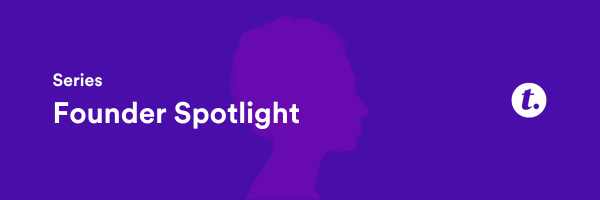
Welcome to Transform’s Founder Spotlight Series, an exciting journey into the minds of innovative leaders who are disrupting the now and next of work.
In each Q&A-style article, we’ll introduce you to founders like Blair Christie, Founder and CEO of Denim, who are redefining the boundaries of their industries with forward-thinking ideas and transformative approaches.
About Blair
Blair Christie is the Founder & CEO of Denim – a mobile solution that makes retaining and growing a happier, more productive frontline workforce easy. Analytically powered, Denim combines engagement, communication, personalized tasks, and recognition to help employees do their best work. She serves as an independent board member in the Cybersecurity, Healthcare, and IT industries. During her 17-year career with Cisco, as CMO and Senior Vice President, Blair oversaw the strongest growth of Cisco’s brand value in the company’s history. She’s a 2015 Aspen Institute’s Henry Crown Fellow and holds a B.S. degree and MBA from Drexel University.
About Denim
Denim is on a mission to reimagine work for the frontline workforce. Denim delivers a holistic approach to communications, performance, engagement, and rewards and recognition for on-the-move, deskless workers. With its engaging, mobile-first interface and intelligent data engine, Denim has cracked the code on improving retention, employee engagement, and productivity for companies that rely on a frontline workforce.
Let’s dive into Blair’s founder story, and learn firsthand about her inspirations, challenges, and breakthroughs that marked her path to success.
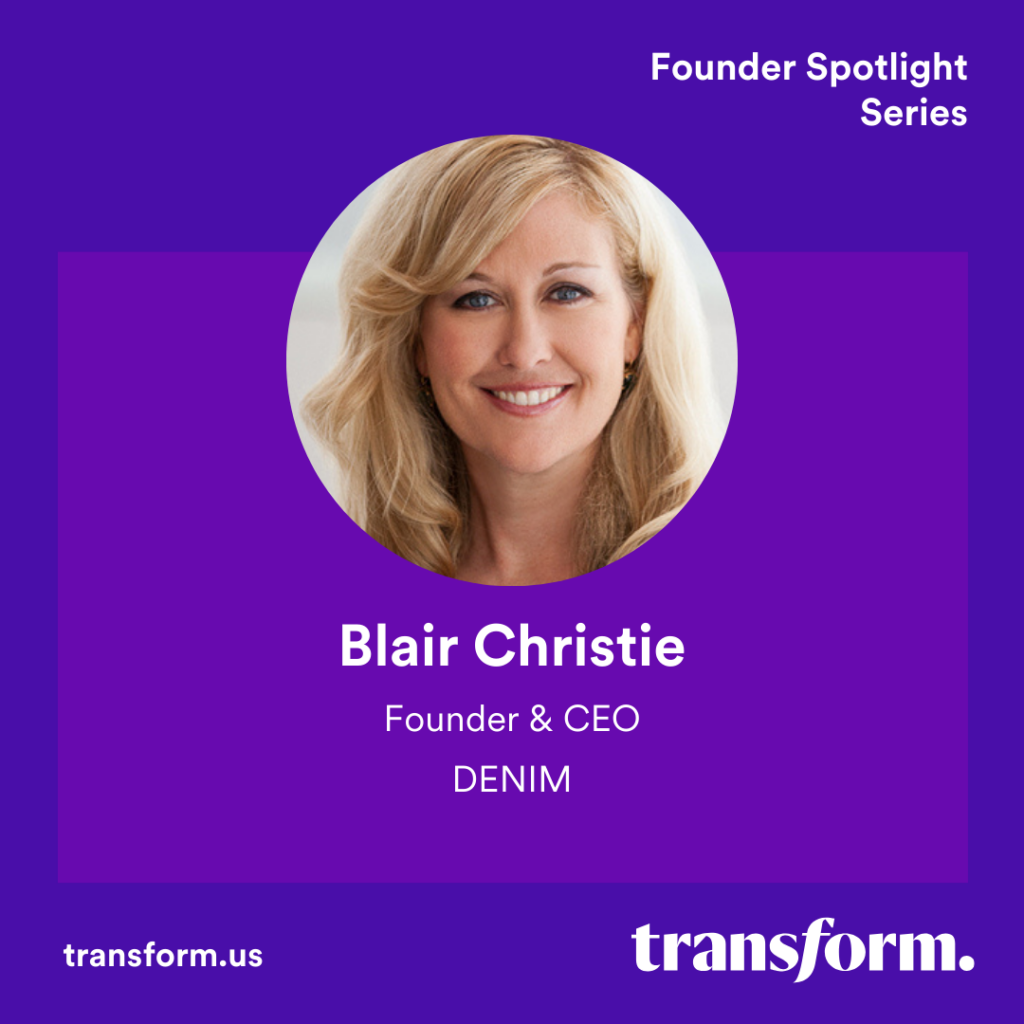
The Startup Journey
Q: What gave you the idea to start Denim?
A: We saw the significant challenges faced by companies that rely on a frontline workforce – such as high turnover, lower productivity, and an overall lack of employee engagement.
We realized these are actually symptoms of a much larger problem – the lack of a compelling employee value proposition for these employees.
We believe if we could help companies deliver the right tools at the right time – purpose-built for deskless workers – then employees would engage, perform, and stay with their organizations longer.
Seems obvious, doesn’t it? Those of us with desks – often called “knowledge workers’ – have had this for decades. However, the frontline – with no desk, limited or no email access, and in constant motion – doesn’t have the same communication channels or connections to help them deliver their very best work.
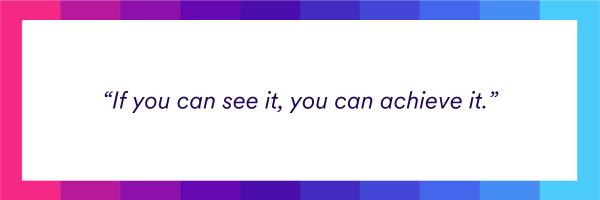
Product Development
Q: Who benefits from Denim?
A: .Frontline workforces and the companies who rely on them.
Q: Why is this so important?
A: There is a significant gap in the relationship between deskless, hourly workers and their organizations. This is evident by the fact that over 30% of employees leave in their first 90 days.
Organizations simply do not set up their frontline employees to be successful. They spend more money on recruiting and staffing than on communication and development. Their frontline lacks tools to understand how to be successful or how to be recognized and rewarded when they are successful.
At Denim, we believe everyone deserves to feel valued and connected, even at work. That is why we are on a mission to revolutionize work for the frontline workforce.
Q: What are some examples of companies leveraging Denim?
A: Manufacturing, warehousing, distribution, and hospitality companies are seeing an ROI by deploying Denim.

Q: What have you learned from your users and customers so far?
A: Frontline workers want the same things from their careers as desk workers – transparent communication, clear goals/expectations, and recognition for a job well done. While organizations and supervisors often intend to deliver this experience, they often simply can’t. The tools and data to ensure connections exist in the unique workflow of a deskless worker just have not existed to date.
Scaling & Growth
Q: How do you build a strong company culture while scaling the business?
A: At the end of the day, actions speak louder than words. For Denim, we’ve made conscious choices about our vision, mission, and values. We’ve articulated them clearly and hold each other accountable to live by them. We have a very open and honest communication approach – even when things aren’t working. (actually, especially when things aren’t working!)
As a leader, the easiest way to do this is to be consistent and vulnerable. Consistent in how you lead and communicate, so your team knows what to expect.
Vulnerable in what you know and don’t know, so your team realizes their value when they fill in your gap (which they often do!), as well as trust your word.
Fundraising
Q: How do you maintain strong relationships with your investors and optimize their contributions?
A: Regular updates and outreach are always the ticket to entry.
We have scheduled times to connect with our investors and advisors and make sure we reach out when things are both going well and are challenging.
Asking for help (vulnerability!) is always an important part of the relationship.
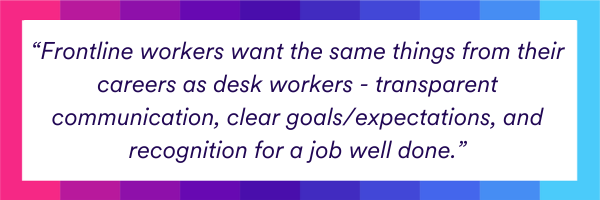
Q: What advice do you have to similarly situated founders as they begin fundraising?
A:
- Just like with your team, be consistent and predictable in your communication.
- Be honest about your business and your needs.
- Hone your vision and your unique differentiation.
- Be thoughtful of their time.
Team Building & Leadership
Q: What are your strategies for attracting and retaining talent?
A: At this stage, it’s all about leveraging our network. We are also often meeting great people and creating connections even when we are not hiring. Developing a pipeline outside of a hiring moment is incredibly helpful.
Q: What leadership skills do you believe are critical in the current environment?
A: Resiliency, confidence, and creativity.
Marketing & Branding
Q: How do you differentiate your brand from competitors?
A: We know Denim’s focus on performance, not just engagement, delivers tangible value to our customers. We are connecting engagement and recognition to real business outcomes – which delivers a win-win for employees and their employers. We don’t see others doing this like Denim is today.
Additionally, Denim creates more connections with employees in the flow of work, which in turn, provides more data and more moments of influence for our customers.
If your goal is to retain and develop the employees you’ve already invested in, more connections and a better understanding of their motivations are critical.
Challenges & Lessons Learned
Q: Can you share any specific lessons or mistakes you made during the startup journey and how you overcame them?
A: We’ve definitely made a few mistakes we are learning from!
- Spending too much $$ early on.
- Not investing/scaling our GTM/Sales capability early enough.
- Hired too quickly.
Q: What advice do you have for other founders?
A:
- Hire slow, fire fast.
- Be sure you are thinking through your sales strategy as early as possible.
- Pressure test your assumptions with someone outside of your team regularly.
- Be sure you are building the ‘must have’, not the ‘nice to have’.
Industry and Market Insights
Q: What is one significant trend or prediction that you believe will drive the transformation of work?
A: The next era of productivity gains will come from the frontline workforce. How much and how fast will be determined by the rate their employees embrace and deliver a better employee valuable proposition.
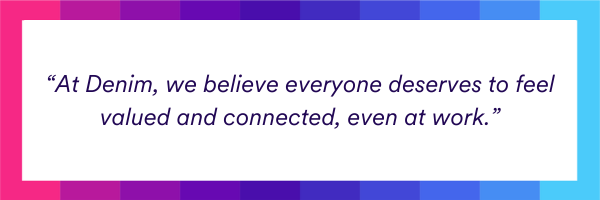
Company Vision
Q: What’s next for you and Denim?
A: We’ve proven our first two hypotheses and now it’s time to prove our third.
#1. Frontline employees will engage in a mobile-based solution.
#2. Denim’s solution can deliver a measurable, meaningful ROI in less than six months.
#3. We can scale Denim across multiple customers and create a robust employee behavior data platform.
Q: What would you like to say to People leaders who are thinking of using Denim?
A: Frontline employees can no longer be viewed as commodity talent. They are the easiest lever to pull to gain a competitive advantage, but they must be set up to be successful. Employers will soon have no choice but to invest in their experience to attract, retain & develop the best people.
On a Personal Note
Q: Describe your perfect day when you aren’t working.
A: My perfect day when I am not working consists of a morning paddle board session, a great cup of coffee, gardening, time with family and/or friends, and an incredible night’s sleep.
Q: What is your personal mantra?
A: If you can see it, you can achieve it.
See Blair speak at Transform 2024 . Join us for engaging conversations and community as we transform the now and next of work – together.
